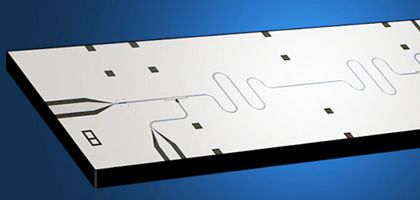Quantum computer: a hypothetical computer that, by using quantum mechanical effects, does not require any computation time for certain operations; thus it performs these computations at infinite speed.
Quantum effects are predictions of quantum theory that do not correspond to anything in our daily observations. One such quantum effect is the ►uncertainty principle already described in earlier articles. Another effect that could be used to accelerate computational operations is the entanglement of ►elementary particles. When two particles are entangled they constitute a joint quantum system. This system remains even if the particles are moved away from each other. In place of their separate physical properties (such as the spin of the particles), there will be only one total rotation of the system made up of the various individual subrotations. This has the effect that any measurement of the first particle immediately affects the measurement of the second, no matter how distant the two are from each other. Einstein called this effect "spooky action at a distance" and dismissed its possibility. Nonetheless, its existence has been confirmed in numerous experiments. It has long been used for industrial purposes in ►superconductivity, the flow of charged particles through a material without resistance.
A standard computer uses small units of information, so-called bits, each of which takes on a value of either 0 or 1. They are realized as states of memory cells. To copy a bit you need to read out the old memory cell and change the new one. That takes time. A quantum computer, by contrast, works with qubits (quantum bits) instead of bits; these consist of entangled particles instead of memory cells. Thus, when "reading out" such a particle, all entangled partners are simultaneously affected without any time lag. Moreover, a qubit can memorize not only 0 or 1 but also all intermediate values. With sophisticated methods these two effects can be utilized to tackle certain tasks — such as the identification of prime numbers or the cracking of codes — much faster than would be possible with a conventional computer.
The technical difficulty does not consist in creating entanglements so much as in maintaining them over time. This is because each contact with anything external, whether it be a ray of light or a single atom, destroys the entanglement. For this reason, previous experiments have employed charged atoms as qubits, which float in a vacuum and are kept in place by a magnetic field — a so-called ion trap. Here the information is encoded in the rotation of the atoms. A laser beam reads and manipulates the individual qubits. The quantum mechanical coupling is triggered by joint vibrations of the chain of atoms.
![]()
First Qubyte (Rainer Blatt, Phys. Journ. 4, 11
/ 2005)
The image above does not look much like a computer. But the atom chain consisting of 8 single qubits is already able to conduct simple computations. To achieve this, up to 4 particles are entangled. This combination allows for an almost infinite number of modes of entanglement, thus pushing the limits of quantum theory. Perhaps in this way we can even find novel principles of physics. A real quantum computer would consist of many coupled qubit memories that are activated by a conventional computer.

First quantum processor (Blake Johnson / Yale University 2009)
The above quantum processor was built in June 2009 by Leonardo DiCarlo at Yale. It is able to run simple algorithms with an error rate of 20% and consists of a niob coated aluminium foil. Small gaps are etched in the niob structure. The aluminium atoms can be entangled through a microwave ray, and stay entangled for about one microsecond.
The construction of a real working quantum computer requires a deep knowledge of and far-reaching control in the world of physical matter. We can therefore say that a quantum computer would be a significant milestone in the development of civilization — perhaps the most important milestone after the invention of the wheel.